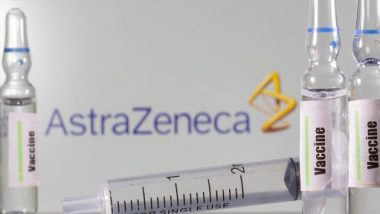Berlin, March 30: Several health authorities in Germany announced Tuesday that they are again suspending the use of AstraZeneca's coronavirus vaccine for residents under age 60 amid fresh reports of unusual blood clots in people who recently received the shots.
Officials in Berlin, Munich and the eastern state of Brandenburg took the decision to temporarily halt vaccinations ahead of a meeting later Tuesday of representatives from Germany's 16 states.
The country's medical regulator said it had received a total of 31 reports of rare blood clots in recent recipients of the AstraZeneca vaccine by March 29. Nine of the people died and all but two of the cases involved women aged 20 to 63, the Paul Ehrlich Institute said. COVID-19 Vaccine Update: Canada Suspends Use of AstraZeneca's Coronavirus Vax For People Under 55 Years.
German Chancellor Angela Merkel and her health minister, Jens Spahn, planned to hold a news conference late Tuesday on the outcome of their meeting with the states.
Reports of an unusual form of blood clot in the head, known as sinus vein thrombosis, prompted several European countries to temporarily halt the use of the AstraZeneca vaccine earlier this month. After a review by medical experts, the European Medicines Agency concluded the benefits of the vaccine outweighed the risks.
At the same time, the agency recommended that warnings about possible rare side effects should be provided to patients and doctors. Most European Union countries, including Germany, resumed use of the vaccine. On Monday, Canada suspended use of the AstraZeneca vaccine in people under 55, citing new concerning data from Europe.
“There is substantial uncertainty about the benefit of providing AstraZeneca Covid-19 vaccines to adults under 55 given the potential risks,” said Dr. Shelley Deeks, vice chair of Canada's National Advisory Committee on Immunization.
Deeks said the updated recommendations come amid new data from Europe that suggests the risk of blood clots is now potentially as high as one in 100,000, much higher than the one in one million risk believed before.
Earlier Tuesday, two state-owned hospitals in Berlin announced that they had stopped giving the AstraZeneca vaccine to female staff members under 55. The heads of five university hospitals in western Germany called for a temporary halt to the vaccine for all younger women, citing the blood clot risk.
Kalayci, the Berlin state health minister, said the suspension of AstraZeneca vaccines for younger people was done as a precaution.
“We have not had a case of serious side effects in Berlin yet,” she said, adding that all of those who had received the AstraZeneca shot already could rest assured that it provides good protection against the coronavirus.
“Still, we need to treat it carefully and wait for the talks taking place at the federal level,” said Kalayci. The decision could affect appointments for tens of thousands of teachers and people with preexisting conditions who received invitations to get vaccinated in Germany's capital in recent days.
German news agency dpa quoted a spokesman for Munich, the country's third-largest city, saying that the suspension of AstraZeneca vaccinations for people younger than 60 would last “until issue of possible vaccine complications for this group of persons has been resolved.”
Some 2.7 million doses of the AstraZeneca vaccine have been administered across the whole of Germany so far. Scientists at the University of Greifswald, Germany, this week published the results of their investigation into the possible causes of the blood clots, saying the condition is similar to a side effect seen in some patients who receive the blood thinning medication heparin.
The study, which hasn't been peer-reviewed yet, doesn't provide a conclusive explanation for why some people vaccinated with the AstraZeneca shot develop the rare blood clots. Still, experts not involved in the study said it offers important information for doctors.
“Since this (blood clotting) mechanism is already known in modified form, there is a therapy option for the patients, which is very reassuring,” said Alice Assinger, a specialist in vascular diseases and blood clot research at the Medical University of Vienna.
Bernd Salzberger, an infection specialist at the University Hospital Regensburg in Germany, cautioned that the generally low risk of death from COVID-19 in younger women could be similar to the risk of suffering a serious blood clot. “That's why the AstraZeneca vaccine should be primarily used in older people,” he said. COVID-19 Vaccine Update: Sweden Stops Use of AstraZeneca Vaccine Amid Reports of Blood Clots in Some Recipients.
Some other European countries remain hesitant about giving the AstraZeneca shot to older people. In Madrid, residents ages 60 to 65 started receiving the vaccine Tuesday ahead of those between the ages of 66 and 79 because Spanish authorities have not yet reviewed new data provided by AstraZeneca about how well it works in the older age group.
Spain is currently using the Pfizer/BioNTech and Moderna vaccines for people over 80 years old. Spanish health authorities have said that they are hoping to speed up the rollout of vaccines with the arrival of the jab developed by the pharmaceutical company Janssen, a subsidiary of Johnson & Johnson, which has also been approved for use in Europe and requires one shot only.
(This is an unedited and auto-generated story from Syndicated News feed, LatestLY Staff may not have modified or edited the content body)













 Quickly
Quickly




















